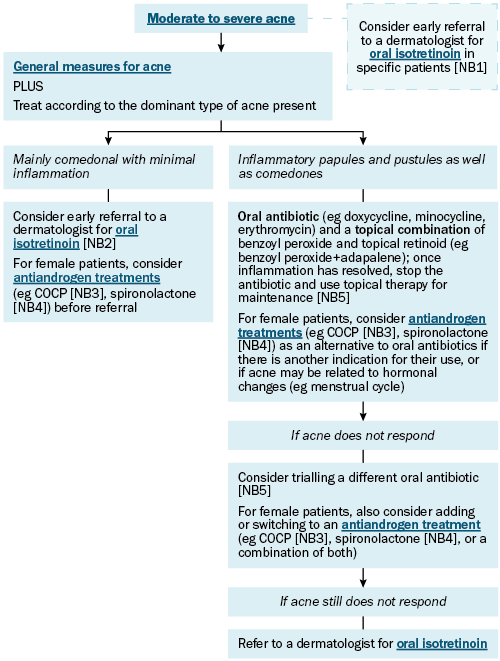Treatment of moderate to severe acne
Treatment of moderate to severe acne outlines treatment of moderate to severe acne.

COCP = combined oral contraceptive pill
NB1: Consider early referral if acne is severe (ie cystic, nodular, very inflammatory), is scarring (even mild persistent acne can scar), presents in a patient with a family history of severe scarring acne, is resistant to other treatments, repeatedly relapses, or has a marked negative emotional and social effect.
NB2: An oral antibiotic will not be effective because antibiotics are used for their anti-inflammatory effect.
NB3: A COCP that contains a progestogen that is antiandrogenic (eg cyproterone, dienogest, drospirenone) or less androgenic than levonorgestrel (eg desogestrel, gestodene, norethisterone) may theoretically be more beneficial for acne than other COCPs; see Contraception in individuals with acne in the Sexual and Reproductive Health guidelines.
NB4: Spironolactone is usually considered in females if a COCP is contraindicated, not desired or not tolerated, or if a COCP is not sufficient as monotherapy.
NB5: Avoid using oral antibiotic therapy long term (eg 12 months). Once papular inflammation has resolved or inflammatory acne activity is controlled, stop the oral antibiotic and continue topical treatment for maintenance. If inflammation recurs, resume oral antibiotic therapy, and regularly review for ongoing need.
Consider early referral to a dermatologist for oral isotretinoin if acne:
- is severe (ie cystic, nodular, very inflammatory)
- is scarring (even mild persistent acne can scar)
- presents in a patient with a family history of severe scarring acne
- is resistant to other treatments, or repeatedly relapses
- has a marked negative emotional and social effect.
In addition to general measures, initial treatment of moderate to severe acne depends on the dominant type of acne present:
- If moderate to severe acne is mainly comedonal and inflammation is minimal, consider early referral to a dermatologist for oral isotretinoin. An oral antibiotic will not be effective because antibiotics are used for their anti-inflammatory effect. For female patients, consider an antiandrogen treatment before referral.
- If moderate to severe acne has inflammatory papules and pustules as well as comedones, combine an oral antibiotic with a topical combination of benzoyl peroxide and a retinoid (see here for topical doses).
For female patients, antiandrogen treatments (eg the combined oral contraceptive pill, spironolactone) are alternatives to oral antibiotics or can be added to oral antibiotics instead of topical treatment, if there is another indication for their use, or if acne may be related to hormonal changes (eg menstrual cycles).
If an oral antibiotic is used for moderate to severe acne, use a tetracycline antibiotic:
1doxycycline 50 mg orally, once daily until inflammation resolves (usually takes weeks); if response is inadequate, increase to 100 mg once daily until inflammation resolves (usually takes weeks) doxycycline doxycycline doxycycline
OR
2minocycline 50 mg orally, once daily until inflammation resolves (usually takes weeks). minocycline minocycline minocycline
Doxycycline and minocycline may cause photosensitivity—advise patients to avoid sun exposure, wear protective clothing and use sunscreen. Long-term oral antibiotic therapy is not recommended; however, if minocycline is being used long term in patients, check liver biochemistry once a year.
If tetracyclines are not tolerated, or are contraindicated (eg in pregnancy), use:
1erythromycin 250 to 500 mg orally, twice daily until inflammation resolves (usually takes weeks) erythromycin erythromycin erythromycin
OR
1erythromycin (ethyl succinate formulation) 400 to 800 mg orally, twice daily until inflammation resolves (usually takes weeks). erythromycin (ethyl succinate formulation) erythromycin erythromycin
Start treatment with the lower dose of oral antibiotic in smaller patients or to check tolerability.
If acne does not respond:
- in males, try a different oral antibiotic
- in females, try a different oral antibiotic, or add or switch to an antiandrogen treatment (eg combined oral contraceptive pill, spironolactone).
Avoid using oral antibiotic therapy long term (eg 12 months). Once papular inflammation has resolved or inflammatory acne activity is controlled, stop the oral antibiotic and continue topical treatment for maintenanceAsai, 2016The Australasian College of Dermatologists, 2021Zaenglein, 2016Zouboulis, 2015. If inflammation recurs, resume oral antibiotic therapy, and regularly review for ongoing need.
If acne does not respond to trials of other treatments, refer the patient to a dermatologist for consideration of oral isotretinoin. Other oral antibiotics (eg trimethoprim, trimethoprim and sulfamethoxazole combination, dapsone) are used by some dermatologists for acne.
